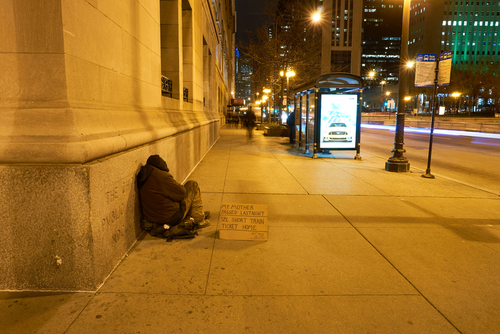



Get new exclusive access to healthcare business reports & breaking news




A group of students at the University of Illinois at Chicago (UIC) are bringing healthcare services to the city’s homeless.
Launched last fall, their initiative, Chicago Street Medicine, is rapidly picking up steam. The group now includes dozens of medical students, residents, physicians, and administrators at the UIC College of Medicine and UI Health.
These students are convinced their model is the future of medicine. “There’s a need for medical services among people experiencing unsheltered homelessness in Chicago,” said Lindsay Waggerman, a Chicago Street Medicine board member and fourth-year edical student.
Waggerman and her colleagues aim to fill that need. They’re doing so by going out into the streets with a backpacks full of medical supplies.
Despite demanding school schedules, students provide twice a month primary care services to people living in homeless encampments across the city. Among other things, they treat colds, coughs, aches, and pains. But they also see a great deal of drug users and teach them how to care for the wounds caused by repeated injections.
Melissa Socarras, a third-year medical student and founding board member of the group, said interacting with people on the streets taught her team something that school hasn’t: how social issues tie to a person’s health.
For instance, putting a bandage on a homeless person’s wound only solves half of the problem. Without the means to clean that wound, the patient won’t properly heal. “You can’t just try to fix the medical problem without fixing the social problem that caused the medical problem to happen in the first place,” said Socarras.
As noble as it is, their work comes with a lot of risks. A lot of homeless patients have a great mistrust of medical institutions and are resistant to suggestions of seeking care in a hospital.
Waggerman said “part of street medicine is recognizing that the people we’re meeting may not be ready to face the medical institutions where they felt mistreated before.”
The group promotes their program via Twitter, where they mobilize volunteers and try to sensibilize the public about social problems and poverty.
Most of the group’s work was documented by a local photographer, whose photos have appeared in national publications like the New York Times, and the Chicago Tribune. The poignant pictures taken by Lloyd DeGrane reveal the raw reality of Chicago’s opioid crisis among the homeless population.
A mile away from downtown Chicago, DeGrane found what he calls “opioid migrants.” “These are people that have come to Chicago because they heard that panhandling is legal here and it’s easy to buy heroin,” DeGrane said. “They’re slaves to dope.”
Along the way, the photographer made friends among the people he was documenting. Some of them, however, died as a result of their poor health. One of the women he took photos of, a drug addict, died a week later after DeGrane had convinced her to go to the UIC Hospital.
Opioid abuse has become a national epidemic in recent years, but in Chicago overdose deaths from opioids are rising at an alarming pace. There were 741 deaths in 2016, representing a 74 percent increase from 426 deaths reported in 2015.
The largest increase was among overdose deaths involving fentanyl, a narcotic used to treat severe pain. However, heroin remained the opioid responsible for the largest percentage of overdose deaths.
For many drug addicts, street medicine also called “reality-based medicine” is the only way to get healthcare. The number of programs like Chicago Street Medicine have grown so widespread across the world that it has its own International Street Medicine Symposium.
In the United States, street medicine programs are operating in at least 45 cities, including New York, Chicago, Atlanta, Los Angeles, Minneapolis, Detroit. and Washington, D.C.